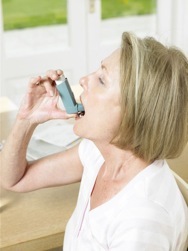-
Respiratory Conditions






Asthma
Asthma is a disease that affects the air passages in the lungs. Exposure to “triggers” (see “Asthma
Attack Triggers” below) causes the airways to narrow. This response is called an “attack” or “episode.”
Signs & Symptoms
-
•A cough lasts more than a week. Coughing may be the only symptom. It may occur during the night or after exercising.
-
•Prolonged shortness of breath. Breathing gets harder and may hurt. It is harder to breathe out than in.
-
•Wheezing.
-
•Chest tightness or pain.
Causes
Genetic factors play a big role. You are more likely to have asthma if you have a family history of it. Being exposed to certain things can set off an immune system response for asthma to develop. Examples are house-dust mites and viral respiratory infections.
Asthma Attack Triggers
-
•Colds, flu, bronchitis, and sinus infections.
-
•Breathing an allergen (pollen, dust mites, mold, animal dander) or irritant (tobacco smoke, air pollution, fumes, perfumes).
-
•Cockroach droppings.
-
•Sulfites. These are additives in wine, etc.
-
•Cold air. Changes in temperature and humidity.
-
•Exercise, especially in outdoor cold air.
-
•Some medicines, such as aspirin, betablockers, and ACE inhibitors.
-
•Strong feelings. These include laughing and crying.
Treatment
Asthma is too complex to treat with over-the-counter products. A doctor should diagnose and monitor asthma. A good way to help manage asthma is to follow a written action management plan that you develop with your doctor. This includes what to do to avoid and deal with asthma triggers, what to do when you have an asthma attack, and what medicines to take. Some kinds are to be taken with an asthma attack. Other kinds are taken daily (or as prescribed) to help prevent asthma attacks.
A yearly flu vaccine is advised. Regular doctor visits are needed to detect any problems and evaluate your use of medicines. It is also important to treat other problems that make it hard to manage asthma. Examples are reflux of stomach acids, being overweight, and sleep apnea.








Self-Care / Prevention
-
•Follow your written action management plan. Take medications as prescribed. Keep your asthma rescue medicine handy.
-
•Avoid your asthma triggers.
-
•Don’t smoke. Don’t let others smoke in your home. Stay away from smoke and air pollution.
-
•Drink lots of liquids (2 to 3 quarts a day).
-
•Wear a scarf around your mouth and nose when you are outside in cold weather. Doing this warms the air as you breathe it in and prevents cold air from reaching sensitive airways.
-
•Stop exercising if you start to wheeze.
-
•Try to keep your bedroom allergen-free.
-
-Sleep with no pillow or the kind your doctor suggests. Use a plastic or “allergen-free” cover on your mattress and pillow (if you use one). Wash mattress pads in hot water every week.
Is it so hard for you to breathe that you can’t say 4 or 5 words between breaths or you can’t eat or sleep? Are you wheezing and do you take corticosteroid medicine or does wheezing not stop after your prescribed treatment?
Do you have a fever with heavy breathing or is your peak expiratory flow (PEF) below 50% of your personal best number?
Is your peak expiratory flow (PEF) 50 to 80% of your personal best number or do you use your bronchodilator more than 2 times a week?
Questions to Ask
Do you have signs of an infection, such as a fever, and/or cough with mucus that is green, yellow, or bloody-colored? Or, are your asthma attacks coming more often or getting worse?

Keep your asthma rescue medicine handy.
-
-Use throw rugs, not carpeting. Use curtains or drapes that can be washed.
-
-Get someone to dust and vacuum once a week. Use a vacuum with a HEPA filter or double-thickness bags. If you vacuum or dust, wear a dust filter mask.
-
-Don’t use perfumes.
-
-Put an electronic air filter on your furnace or use portable air purifiers. Change and/or wash furnace and air conditioner filters regularly.
-
•Don’t eat foods with sulfites, such as wine and some shellfish.
-
•Sit up during an asthma attack.
-
•Use acetaminophen, not aspirin.




Get more information from:
HealthyLearn® | www.HealthyLearn.com. Click on MedlinePlus®.
National Heart, Lung, and Blood Institute (NHLBI) | 800.575.WELL (575.9355) | www.nhlbi.nih.gov



Copyright © 2009, American Institute for Preventive Medicine. All rights reserved.